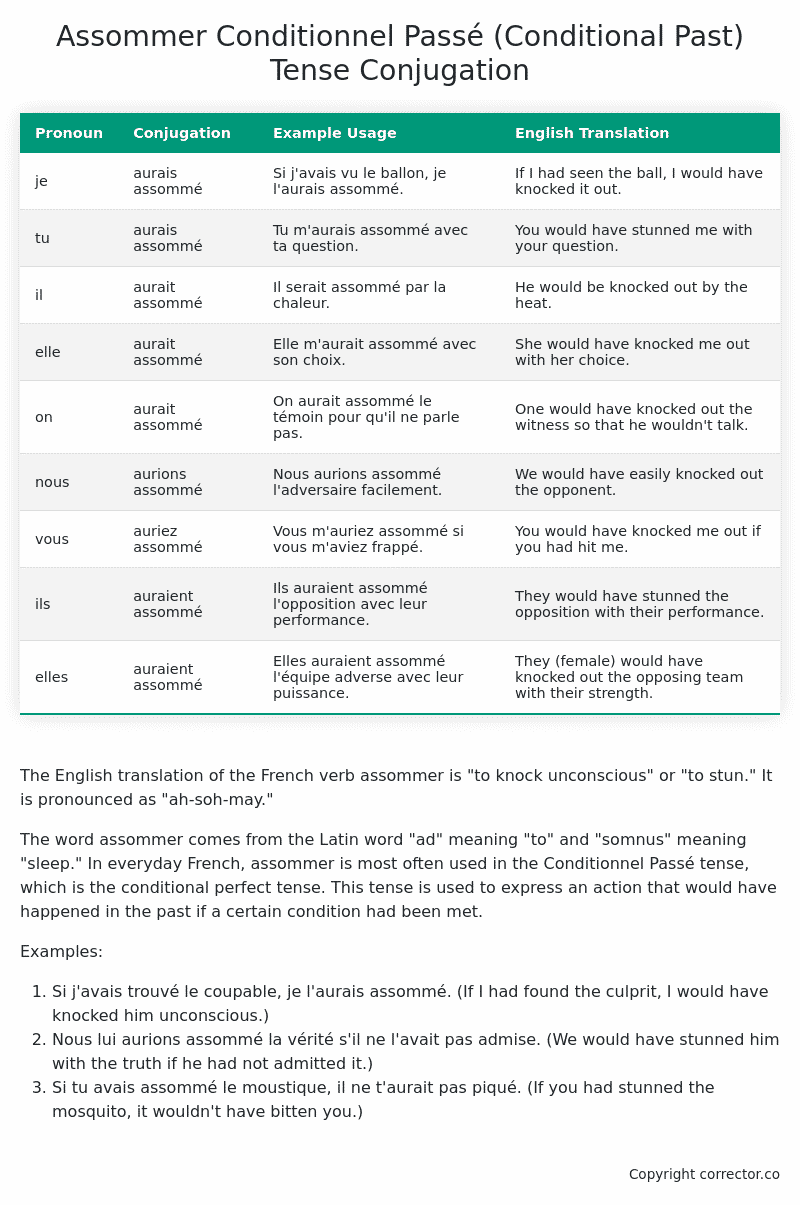Conditionnel Passé (Conditional Past) Tense Conjugation of the French Verb assommer
Introduction to the verb assommer
The English translation of the French verb assommer is “to knock unconscious” or “to stun.” It is pronounced as “ah-soh-may.”
The word assommer comes from the Latin word “ad” meaning “to” and “somnus” meaning “sleep.” In everyday French, assommer is most often used in the Conditionnel Passé tense, which is the conditional perfect tense. This tense is used to express an action that would have happened in the past if a certain condition had been met.
Examples:
- Si j’avais trouvé le coupable, je l’aurais assommé. (If I had found the culprit, I would have knocked him unconscious.)
- Nous lui aurions assommé la vérité s’il ne l’avait pas admise. (We would have stunned him with the truth if he had not admitted it.)
- Si tu avais assommé le moustique, il ne t’aurait pas piqué. (If you had stunned the mosquito, it wouldn’t have bitten you.)
Table of the Conditionnel Passé (Conditional Past) Tense Conjugation of assommer
| Pronoun | Conjugation | Example Usage | English Translation |
|---|---|---|---|
| je | aurais assommé | Si j’avais vu le ballon, je l’aurais assommé. | If I had seen the ball, I would have knocked it out. |
| tu | aurais assommé | Tu m’aurais assommé avec ta question. | You would have stunned me with your question. |
| il | aurait assommé | Il serait assommé par la chaleur. | He would be knocked out by the heat. |
| elle | aurait assommé | Elle m’aurait assommé avec son choix. | She would have knocked me out with her choice. |
| on | aurait assommé | On aurait assommé le témoin pour qu’il ne parle pas. | One would have knocked out the witness so that he wouldn’t talk. |
| nous | aurions assommé | Nous aurions assommé l’adversaire facilement. | We would have easily knocked out the opponent. |
| vous | auriez assommé | Vous m’auriez assommé si vous m’aviez frappé. | You would have knocked me out if you had hit me. |
| ils | auraient assommé | Ils auraient assommé l’opposition avec leur performance. | They would have stunned the opposition with their performance. |
| elles | auraient assommé | Elles auraient assommé l’équipe adverse avec leur puissance. | They (female) would have knocked out the opposing team with their strength. |
Other Conjugations for Assommer.
Le Present (Present Tense) Conjugation of the French Verb assommer
Imparfait (Imperfect) Tense Conjugation of the French Verb assommer
Passé Simple (Simple Past) Tense Conjugation of the French Verb assommer
Passé Composé (Present Perfect) Tense Conjugation of the French Verb assommer
Futur Simple (Simple Future) Tense Conjugation of the French Verb assommer
Futur Proche (Near Future) Tense Conjugation of the French Verb assommer
Plus-que-parfait (Pluperfect) Tense Conjugation of the French Verb assommer
Passé Antérieur (Past Anterior) Tense Conjugation of the French Verb assommer
Futur Antérieur (Future Anterior) Tense Conjugation of the French Verb assommer
Subjonctif Présent (Subjunctive Present) Tense Conjugation of the French Verb assommer
Subjonctif Passé (Subjunctive Past) Tense Conjugation of the French Verb assommer
Subjonctif Imparfait (Subjunctive Imperfect) Tense Conjugation of the French Verb assommer
Subjonctif Plus-que-parfait (Subjunctive Pluperfect) Tense Conjugation of the French Verb assommer
Conditionnel Présent (Conditional Present) Tense Conjugation of the French Verb assommer
Conditionnel Passé (Conditional Past) Tense Conjugation of the French Verb assommer (this article)
L’impératif Présent (Imperative Present) Tense Conjugation of the French Verb assommer
L’infinitif Présent (Infinitive Present) Tense Conjugation of the French Verb assommer
Struggling with French verbs or the language in general? Why not use our free French Grammar Checker – no registration required!
Get a FREE Download Study Sheet of this Conjugation 🔥
Simply right click the image below, click “save image” and get your free reference for the assommer Conditionnel Passé tense conjugation!

Assommer – About the French Conditionnel Passé (Conditional Past) Tense
Formation
Common Everyday Usage Patterns
Expressing Unreal Past Scenarios
Polite Requests or Suggestions
Expressing Doubt or Uncertainty
Interactions with Other Tenses
Conditional Present
Indicative Past Tenses
Conditional Future
Summary
Want More?
I hope you enjoyed this article on the verb assommer. Still in a learning mood? Check out another TOTALLY random French verb conjugation!


